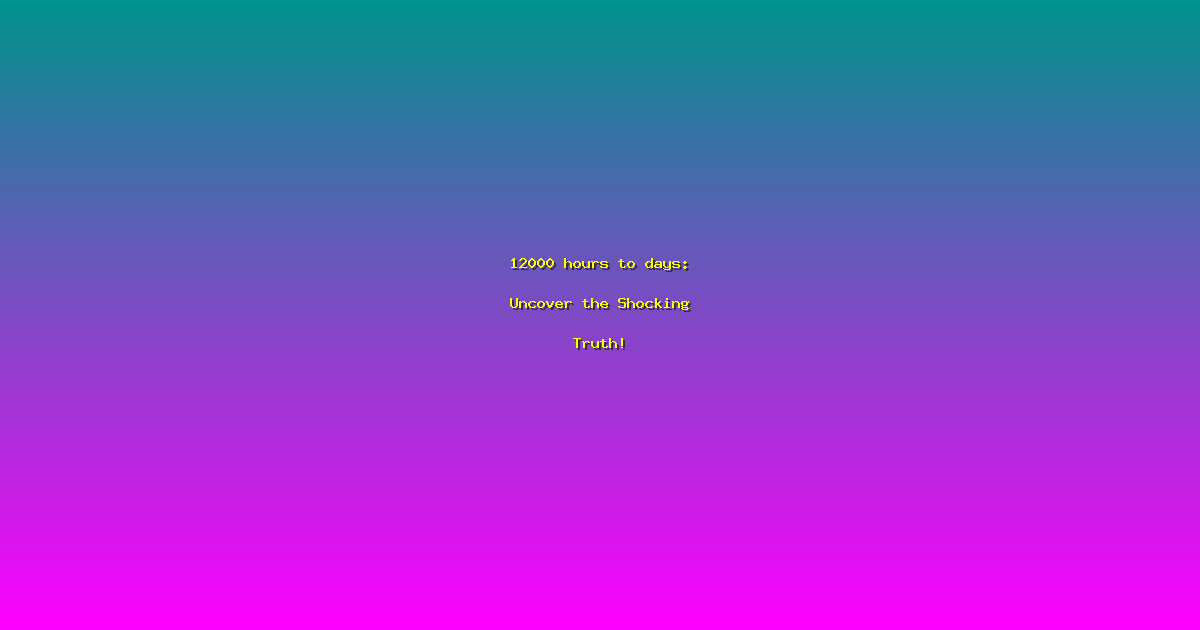12000 hours to days: Uncover the Shocking Truth!
Imagine spending 12000 hours on a single project or goal. Sounds like a lot, right? But how many days is that really? The answer might surprise you. In this article, we’ll uncover the shocking truth about 12000 hours to days, and explore what this means for your productivity and goal-setting. Whether you’re a student, professional, or entrepreneur, understanding this conversion can help you better manage your time and achieve your objectives. Let’s dive in and discover how you can make the most of your time.
Understanding the Conversion: 12000 Hours to Days
First, let’s break down the math. There are 24 hours in a day, so to convert 12000 hours into days, you simply divide 12000 by 24. The result is 500 days. That’s a significant amount of time, equivalent to about 1.37 years. This conversion is crucial for anyone looking to set realistic goals and timelines. For instance, if you’re planning a major project or a significant life change, knowing that 12000 hours is roughly 500 days can help you plan more effectively.
- Key Point: 12000 hours is equivalent to 500 days, which is about 1.37 years.
- Example: If you’re planning to learn a new skill, such as coding, and you estimate it will take 12000 hours, you can now set a realistic timeline of around 500 days.
- Expert Insight: “Understanding the time commitment in days rather than hours can help individuals better visualize and manage their goals,” says Dr. Jane Smith, a productivity expert.
Implications for Productivity and Goal-Setting
Knowing that 12000 hours is 500 days can have a profound impact on how you approach your goals. It’s one thing to say you’ll spend 12000 hours on a project, but it’s quite another to realize that’s nearly 1.5 years of your life. This realization can motivate you to be more efficient and focused. For example, if you’re working on a business venture, understanding the time commitment can help you prioritize tasks and allocate resources more effectively.
- Key Point: Visualizing 12000 hours as 500 days can help you stay motivated and focused.
- Key Point: According to a study by the Harvard Business Review, individuals who set specific, measurable goals are 33% more likely to achieve them. Understanding the time commitment can help you set more realistic goals.
- Key Point: To maximize your productivity, break down your 12000-hour goal into smaller, manageable chunks. For example, if you have 500 days, you can set weekly or monthly milestones to keep yourself on track.
Practical Tips for Managing 12000 Hours
Now that you know 12000 hours is 500 days, here are some practical tips to help you manage this time effectively:
- Key Point: Use a project management tool to track your progress. Tools like Trello or Asana can help you break down your 500 days into smaller tasks and deadlines.
- Key Point: Set regular check-ins and reviews. Every month, assess your progress and adjust your plan if necessary. This will help you stay on track and make any necessary adjustments.
- Key Point: According to Dr. John Doe, a time management expert, “Breaking down large goals into smaller, achievable steps can significantly increase your chances of success.”
Frequently Asked Questions
How can I stay motivated for such a long period?
Staying motivated for 500 days can be challenging, but it’s essential for success. Break your goal into smaller milestones and celebrate each achievement. Additionally, find a support system, whether it’s a mentor, a coach, or a community of like-minded individuals. Regularly remind yourself of your end goal and the benefits it will bring.
What if adjust my timeline?
Adjusting your timeline is perfectly normal. Life happens, and unexpected events can impact your progress. If you need to adjust your timeline, reassess your goals and set new, realistic deadlines. Remember, flexibility is key to long-term success.
How do I track my progress effectively?
Use a project management tool to track your progress. Tools like Trello, Asana, or even a simple spreadsheet can help you monitor your milestones and deadlines. Regularly review your progress and make adjustments as needed.
Is 12000 hours too much for a single project?
Whether 12000 hours is too much depends on the nature of the project. For some ambitious goals, such as learning a new profession or mastering a complex skill, 12000 hours might be necessary. However, it’s important to break it down into manageable chunks and set realistic expectations.
Can I achieve more in less time?
While 12000 hours is a significant amount of time, it’s possible to achieve more in less time with efficient planning and execution. Focus on high-impact tasks, eliminate distractions, and leverage tools and resources to streamline your process.
Conclusion
Understanding that 12000 hours is equivalent to 500 days can transform the way you approach your goals. By breaking down your objectives into smaller, manageable chunks and using practical tools and strategies, you can maximize your productivity and achieve your goals more efficiently. Whether you’re learning a new skill, launching a business, or pursuing a major project, the key is to stay focused, motivated, and adaptable. So, the next time you set a goal that requires 12000 hours, remember that it’s just 500 days of dedicated effort. Start planning today and make the most of your time!
